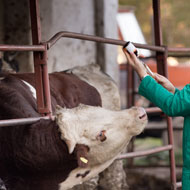Cattle vets urged to cut antibiotic use

Dr Elizabeth Berry said there is still potential to reduce antibiotic use in some areas.
The British Cattle Veterinary Association (BCVA) is urging vets to avoid preventative use of antibiotics where possible, and to clamp down on the use of critically important antibiotics (CIAs).
Dr Elizabeth Berry, who prepared the recommendations, said that although responsible use of antibiotics has been promoted across the farming sectors for many years, there is still potential to reduce their use in some areas, and to move away from CIAs, which are important for human health.
Work is also needed to establish the levels being used in cattle, so that appropriate targets can be set.
Dr Berry added: “We are recommending reducing both the overall amount of antibiotics used in cattle practice and minimising the use of the high priority CIAs – namely third and fourth generation cephalosporins, fluoroquinolones and colistin.
“These drugs should only be used where they have been demonstrated by sensitivity testing to be the only suitable choice to avoid unnecessary suffering.”
The use of antibiotics as a preventative should also be avoided if possible, unless this will compromise animal welfare.
“Where preventative treatment – or prophylaxis – is used it should be regarded as an interim measure whilst alternative management or vaccination strategies are implemented,” Dr Berry explained.
“For example, all cows which comply with recommendations for using an internal teat sealant should be considered for non-antibiotic treatments at drying off.”
BCVA advises all farms to have a herd health plan and follow farm management best practice, such as the guidelines issued by Red Tractor farm assurance.
Farms should also establish their herd BVD status, and eradicate disease if it is found. “BVD can have a detrimental effect on incidence of many diseases and its eradication will have a significant impact on the need for antimicrobial use,” Dr Berry said.
BCVA’s position has been welcomed by RUMA, which promotes responsible use of medicines in farming. Secretary general John Fitzgerald said it recognises that “banning preventative use outright or access to critically important antibiotics is not an answer”.
“Both are important tools in fighting disease and preventing suffering so we still need them – but we need to use them more strategically and only when no other options exist.”
The complete list of guidelines can be downloaded from the BCVA website www.bcva.eu



 The latest
The latest